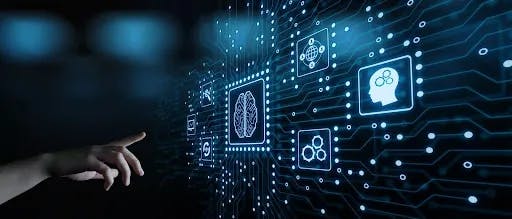Leverage Turing Intelligence capabilities to integrate AI into your operations, enhance automation, and optimize cloud migration for scalable impact.
Advance foundation model research and improve LLM reasoning, coding, and multimodal capabilities with Turing AGI Advancement.
Access a global network of elite AI professionals through Turing Jobs—vetted experts ready to accelerate your AI initiatives.
FOR DEVELOPERS
How is machine learning transforming the healthcare industry?

Healthcare is one of the fastest-growing industries, and adopting the latest technological innovations such as AI has accelerated its growth further. Healthcare is usually one of the earliest sectors to integrate new tech into its framework for enhanced productivity. It is no surprise that machine learning has profoundly impacted the industry, and it is constantly changing the landscape of the healthcare sector. In this blog, we look at different ways machine learning is transforming healthcare, practical use cases of machine learning applications in healthcare, and explore the future of machine learning in the industry.
Machine learning for healthcare applications uses algorithms with evolving neural network patterns that improve the treatment quality through external data analysis for a particular patient. This data analysis includes evaluating various reports such as CT scans, X-rays, and other screenings. The healthcare sector is now using the applications of deep learning to detect cancer cells. The deep learning system is fed hundreds of cancer cell pictures for memorization. This, in turn, helps in the more accurate and faster detection of cancer cells.
Rise of AI and machine learning in healthcare
AI technologies have penetrated different verticals and domains across various industries worldwide. Healthcare is one industry that has prominently harnessed the power of AI and machine learning to provide more efficient solutions to different requirements in healthcare.
Various AI-powered applications - PathAI, BioSymetrics, and Prognos - utilize machine learning in healthcare to provide medical professionals with an advanced framework and features. Some of the powerful frameworks offered by machine learning in healthcare include classification of diseases, clustering of medical cases for research, prediction of disease prognosis based on data patterns, detection of anomalies, automation for routine tasks, and ranking data based on priority.
The automation powered by machine learning has immense scope to alter the entire dynamic of the healthcare industry. This is why major software companies such as Microsoft, IBM, and Google are constantly looking for AI-powered innovations to deliver increased value and advanced solutions in medicine.
Different ways in which machine learning is revolutionizing healthcare
Machine learning has made a tangible difference in healthcare in different ways. According to a survey conducted by “Healthcare IT News,” 63% of healthcare professionals asserted that AI had delivered enhanced value in pathology, pharma, radiology, and remote health monitoring. A wide array of machine learning applications continue to drive innovation and provide a sophisticated framework for healthcare solutions.
The integration of machine learning in healthcare has laid the platform for better collaboration between different stakeholders, inexpensive and non-invasive surgery options, updated care delivery models, and a holistic approach to therapies. We document how AI and machine learning are transforming healthcare practices.
- Discovery of new drugs: AI has already laid a strong foundation for discovering new drugs and medicines that are more efficient in their overall impact on patients. From screening the drug compounds to evaluating the success rate for a specific medicine depending on physiological factors related to patients, AI is helping pharmaceutical companies develop systemic medicinal solutions to different diseases, including cancer.
Machine learning provides advanced methodologies, including next-gen sequencing and precision medicine, ensuring that the medicinal drug has the desired patient outcome.
For example, Project Hanover from Microsoft uses AI tech and big data to deliver precision medicine tailored to individual patients' requirements.
- Improved diagnostic tools: Machine learning in healthcare is increasingly deployed to extract and analyze patient data for determining patterns that go a long way in diagnosing various diseases such as skin cancer. It can take longer to diagnose diseases without advanced tech, and early diagnosis is crucial for critical illnesses like cancer. According to research using AI-assisted models, 87.5% of pathologists identified more mitoses related to breast carcinoma than conventional diagnoses.
Advanced algorithms are designed for large data sets to provide diagnostic insights that are not as obvious to humans. While it is still a work in progress, machine learning has a massive role in developing enhanced diagnostic models that are key to the success of treatment courses.
For example, Microsoft's InnerEye project uses machine learning to deploy advanced algorithms like Convolutional Neural Network for voxel-wise and automatic segmentation of the medical images.
- Personalized treatment and customer service using NLP: Each patient has its custom body requirements and reactions to various compounds as well as medicines. This is why personalized treatment powered by accurate data in sync with individual needs is key to effective treatment. Machine learning modules use advanced data for analyzing the patient’s history, medical records, and symptoms. This analysis gives more accurate and unbiased findings, ultimately equipping healthcare professionals to handle medical cases better.
For Example- IBM Watson Health uses a combination of AI technologies, including NLP to provide more innovative digital solutions in the healthcare industry.
Several hospitals and healthcare centers don’t have the infrastructure, resources, or bandwidth to manage the constant influx of patients, leading to massive inconvenience. This is where machine learning models can be of great help. The NLP, provided by AI applications, can help deal with the high volume of patients who come in for treatment.
These applications conduct initial screening of patients by logging in relevant data and answering patients’ basic queries without human intervention. The machine learning technology provides optimized solutions for handling new patients, easing the load on doctors, nurses, and healthcare workers.
- Virtual assistants: Virtual assistants are increasingly used by many businesses and industries, including healthcare. These virtual assistants can be deployed for collecting patient information, including details about demographic, insurance, financing, health history, data mining, procurement, and analysis of different records. Various chatbot virtual assistants help engage with the patients, reducing human effort and providing cost-efficient solutions for administrative tasks.
For Example- Healthily, OneRemission, and Florence - Data privacy: The patient’s data is extremely sensitive and confidential. There are often reports of this data getting breached by unethical elements. Machine learning algorithms and modules can be used to prevent such breaches by protecting patients’ data from unauthorized access. These machine learning modules can also implement additional layers of security for sensitive data thus ensuring high levels of data privacy with minimal risks of breaches.
The AI applications powered by machine learning models are widely deployed in healthcare. If you are looking to build robust machine learning applications for healthcare, then you can hire machine learning engineers smoothly at Turing.
Examples of machine learning applications used in healthcare
Numerous machine learning in healthcare applications are deployed for performing a wide range of tasks in the healthcare industry. We take a look at some of these machine learning applications in healthcare.
PathAI: This application uses machine learning to help pathologists to make more accurate and faster diagnoses of patients’ illnesses. It also helps identify patients who might benefit from new treatment methods or therapies.
Project InnerEye from Microsoft: This AI application from Microsoft establishes the difference between healthy anatomy and tumors with the help of 3D radiological images. This helps the medical professionals with surgical planning, radiotherapy, and planning the best course of action for the patients based on accurate data.
Insitro: This app combines data science, machine learning, and advanced lab tech for producing highly efficient drugs that deliver on multiple fronts. The objective is to develop drugs that provide faster treatment to patients and offer these drugs at a cutaway price to make them affordable for all.
BioSymetrics: The BioSymetrics application uses a machine learning platform known as Augusta, which enables the patients to go through data pre-processing and automated machine learning processes. This improves accuracy levels and eliminates human effort as well as the time needed to perform various tasks in the healthcare verticals, including precision medicines, biopharmaceuticals, and hospital systems.
Prognos: The registry of the Prognos application contains around 19 billion entries involving 185 million patients. Using machine learning, the AI platform of the Prognos application can detect diseases early, highlight possibilities for clinical trials, suggest therapy requirements, identify gaps in healthcare, and provide a host of other solutions.
Future of machine learning in healthcare
Today, many significant startups and prominent software companies have invested huge amounts of resources in the development of AI-powered applications for healthcare. As per Rock Health, there was an investment of more than $21.3 billion in healthcare across various AI projects in the opening three quarters of 2021.
This reinforces the importance of artificial intelligence and machine learning in healthcare and how it will shape the industry's future. Today IBM and Google, two of the biggest software companies, have their machine learning healthcare applications in the form of Watson Health and DeepMind health projects, respectively.
The advanced automation provided by data collection and analysis is constantly evolving to provide more scalable, sustainable, and highly efficient solutions in the healthcare industry. The future of healthcare will be shaped by machine learning and AI applications that will inevitably impact how the treatment processes are done. Instead of completely removing the human element, future machine learning applications in healthcare are expected to complement the existing medical structures and their professionals.
Wrapping up
While there are some concerns related to the integration of machine learning in healthcare, there are also endless possibilities. Machine learning developers and various healthcare stakeholders can collaborate effectively to tackle the challenges concerning using machine learning in healthcare. Having witnessed such mammoth growth, we should be future-ready for ML and AI-based solutions for nutrition, clinical decision support (CDS), etc. The future of machine learning in healthcare is exciting, and everyone needs to keep an eye on the possibilities for high-level collaboration between different stakeholders.
Author

Huzefa Chawre
Huzefa is a technical content writer at Turing. He is a computer science graduate and an Oracle-certified associate in Database Administration. Beyond that, he loves sports and is a big football, cricket, and F1 aficionado.
Frequently Asked Questions

Press

Blog
